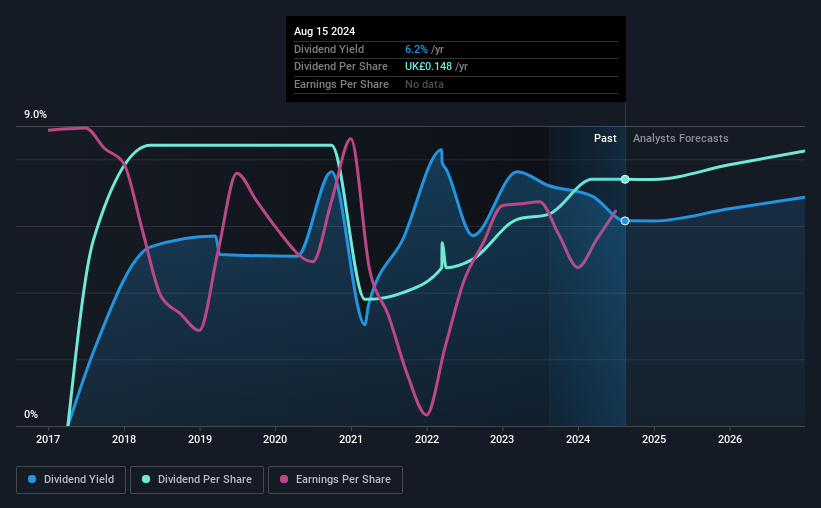
TP ICAP Group PLC's (LON:TCAP) investors are due to receive a payment of £0.048 per share on 8th of November. This means the annual payment is 6.2% of the current stock price, which is above the average for the industry.
Check out our latest analysis for TP ICAP Group
TP ICAP Group's Dividend Is Well Covered By Earnings
A big dividend yield for a few years doesn't mean much if it can't be sustained. Based on the last payment, TP ICAP Group's profits didn't cover the dividend, but the company was generating enough cash instead. Healthy cash flows are always a positive sign, especially when they quite easily cover the dividend.
Over the next year, EPS is forecast to expand by 100.2%. Assuming the dividend continues along the course it has been charting recently, our estimates show the payout ratio being 52% which brings it into quite a comfortable range.

TP ICAP Group's Dividend Has Lacked Consistency
TP ICAP Group has been paying dividends for a while, but the track record isn't stellar. This suggests that the dividend might not be the most reliable. Since 2017, the dividend has gone from £0.112 total annually to £0.148. This implies that the company grew its distributions at a yearly rate of about 4.1% over that duration. It's encouraging to see some dividend growth, but the dividend has been cut at least once, and the size of the cut would eliminate most of the growth anyway, which makes this less attractive as an income investment.
Dividend Growth May Be Hard To Achieve
With a relatively unstable dividend, it's even more important to see if earnings per share is growing. Over the past five years, it looks as though TP ICAP Group's EPS has declined at around 2.9% a year. Declining earnings will inevitably lead to the company paying a lower dividend in line with lower profits. Earnings are forecast to grow over the next 12 months and if that happens we could still be a little bit cautious until it becomes a pattern.
TP ICAP Group's Dividend Doesn't Look Sustainable
In summary, while it's good to see that the dividend hasn't been cut, we are a bit cautious about TP ICAP Group's payments, as there could be some issues with sustaining them into the future. The company is generating plenty of cash, which could maintain the dividend for a while, but the track record hasn't been great. We would probably look elsewhere for an income investment.
Market movements attest to how highly valued a consistent dividend policy is compared to one which is more unpredictable. However, there are other things to consider for investors when analysing stock performance. As an example, we've identified 2 warning signs for TP ICAP Group that you should be aware of before investing. If you are a dividend investor, you might also want to look at our curated list of high yield dividend stocks.
If you're looking to trade TP ICAP Group, open an account with the lowest-cost platform trusted by professionals, Interactive Brokers.
With clients in over 200 countries and territories, and access to 160 markets, IBKR lets you trade stocks, options, futures, forex, bonds and funds from a single integrated account.
Enjoy no hidden fees, no account minimums, and FX conversion rates as low as 0.03%, far better than what most brokers offer.
Sponsored ContentValuation is complex, but we're here to simplify it.
Discover if TP ICAP Group might be undervalued or overvalued with our detailed analysis, featuring fair value estimates, potential risks, dividends, insider trades, and its financial condition.
Access Free AnalysisHave feedback on this article? Concerned about the content? Get in touch with us directly. Alternatively, email editorial-team (at) simplywallst.com.
This article by Simply Wall St is general in nature. We provide commentary based on historical data and analyst forecasts only using an unbiased methodology and our articles are not intended to be financial advice. It does not constitute a recommendation to buy or sell any stock, and does not take account of your objectives, or your financial situation. We aim to bring you long-term focused analysis driven by fundamental data. Note that our analysis may not factor in the latest price-sensitive company announcements or qualitative material. Simply Wall St has no position in any stocks mentioned.
About LSE:TCAP
TP ICAP Group
Provides intermediary services, contextual insights, trade execution, pre-trade and settlement services, and data-led solutions in Europe, the Middle East, Africa, the Americas, and the Asia Pacific.
Good value with proven track record and pays a dividend.
Similar Companies
Market Insights
Community Narratives


